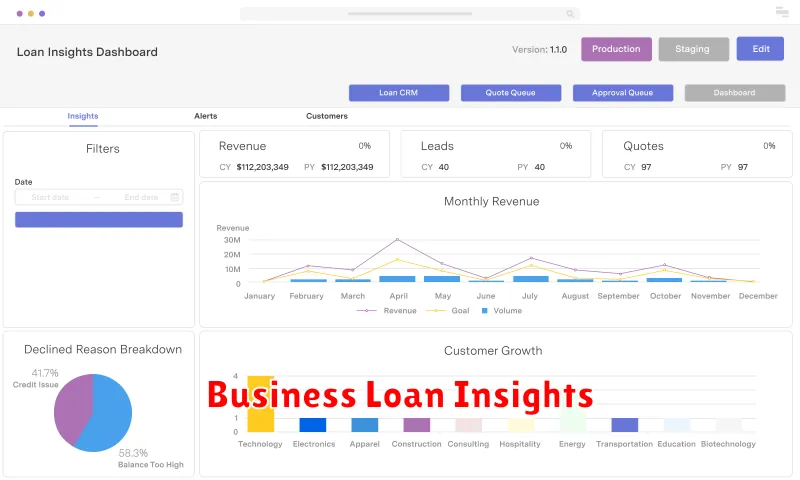Securing a business loan can be a pivotal moment for any entrepreneur, fueling expansion, modernization, or weathering economic storms. However, the process is often shrouded in misinformation, leading many small business owners to make ill-informed decisions. This article will debunk common business loan myths and present the facts every owner should know before applying for financing. Understanding the realities of loan applications, interest rates, and credit requirements is crucial for navigating the complexities of securing the capital needed to thrive. We will explore the critical aspects of small business lending, empowering you to make confident, strategic choices for your company’s financial future.
From misconceptions about credit scores and collateral to the nuances of different loan types, this comprehensive guide will equip you with the knowledge to approach business financing with clarity and confidence. We’ll examine the truth behind frequently heard statements about loan eligibility, helping you separate fact from fiction. By the end, you’ll be better prepared to negotiate favorable terms, understand your options, and ultimately, make sound financial decisions that benefit your business’s growth and long-term success. Learn to navigate the world of business loans with informed decision-making, setting your business on a path to prosperity.
Myth: You Need Perfect Credit to Get Approved

This is a common misconception. While a high credit score certainly improves your chances of loan approval and can lead to more favorable terms, it’s not a strict requirement for all lenders. Many lenders consider various factors beyond credit score, including business revenue, profitability, time in business, and the strength of your business plan.
Lenders understand that businesses, especially startups, may have limited credit history. They often assess risk through a holistic approach, looking at the overall financial health and potential of your business. Alternative lending options may also be available for businesses with less-than-perfect credit, although they might come with higher interest rates.
Therefore, even if your credit score isn’t perfect, it’s still worthwhile to explore your loan options. Shop around and compare offers from different lenders to find the best fit for your business needs.
Fact: Some Lenders Focus More on Cash Flow
Contrary to popular belief, not all lenders prioritize collateral or a high credit score above all else. Many lenders, especially those specializing in small business loans or lines of credit, place significant emphasis on cash flow. This is because consistent cash flow demonstrates the business’s ability to meet its financial obligations, including loan repayments.
These lenders assess your business’s ability to generate sufficient revenue to cover operating expenses and loan payments. They analyze your financial statements, including income statements and cash flow statements, to determine the stability and predictability of your income stream. A strong and consistent cash flow can offset weaknesses in other areas, making you a more attractive borrower.
Therefore, focusing solely on building collateral or improving your personal credit score might not be the most effective strategy for securing a loan. Understanding your business’s cash flow and demonstrating its health is equally, if not more, important to some lenders.
Myth: Startups Can’t Qualify for Loans
Contrary to popular belief, startups can qualify for loans, although it might be more challenging than for established businesses. Lenders assess risk, and startups often present a higher risk profile due to limited operating history and revenue.
However, strong business plans, positive cash flow projections, and a solid personal credit score can significantly improve a startup’s chances of securing funding. Some lenders specialize in providing loans to startups, recognizing the potential for growth and offering tailored financing options.
Alternative financing options such as Small Business Administration (SBA) loans, crowdfunding, and angel investors are also available to startups that may find traditional bank loans difficult to obtain. Exploring all available options is crucial for startups seeking capital.
Ultimately, a startup’s ability to demonstrate financial viability and a clear path to profitability will determine its loan eligibility. While the process may be more rigorous, it’s not insurmountable.
Fact: Collateral Isn’t Always Required
A common misconception surrounding business loans is the requirement for collateral. While some lenders may request it to mitigate risk, especially for larger loan amounts, it’s not always mandatory. Many lenders, particularly those offering smaller loans or focusing on specific industries, assess risk based on factors other than collateral, such as your credit score, business revenue, and cash flow.
Alternative lending options, such as lines of credit or invoice financing, often don’t require collateral. These options are frequently tailored to businesses with strong financial performance but limited assets to pledge.
Therefore, it’s crucial to explore various lenders and loan types to determine which best suits your business’s financial profile and needs. Don’t automatically assume collateral is a prerequisite; actively inquire about loan options that don’t necessitate it.
Myth: All Business Loans Are the Same
This is demonstrably false. Business loans come in a wide variety of forms, each with its own terms, conditions, and eligibility requirements. Understanding these differences is crucial for securing the best financing for your business needs.
For example, a term loan offers a fixed amount of money repaid over a set period, while a line of credit provides access to funds as needed, up to a pre-approved limit. SBA loans, backed by the Small Business Administration, often have more favorable terms than conventional loans but involve a more rigorous application process. Similarly, equipment financing specifically targets the purchase of business equipment, and merchant cash advances offer a faster but often more expensive solution.
The interest rates, fees, and repayment schedules can also vary significantly between loan types and lenders. Failing to compare options thoroughly could lead to selecting a loan that is ultimately unsuitable or financially detrimental to your business.
Therefore, it’s essential to research different loan types and compare offers from multiple lenders before committing to any single business loan. Seek professional advice if needed to navigate the complexities of the financing landscape.
Fact: APR and Fees Can Vary Widely
Annual Percentage Rate (APR) and associated fees for business loans are not standardized. They fluctuate significantly depending on various factors.
These factors include the lender, the borrower’s creditworthiness, the loan amount, the loan term, and the type of loan. A seemingly small difference in APR can translate to thousands of dollars in extra interest paid over the life of the loan.
Comparison shopping is crucial. Don’t settle for the first offer you receive. Explore multiple lenders to secure the most favorable terms, considering both the APR and all included fees.
Be aware of hidden fees. Carefully review all loan documents to understand the total cost of borrowing, beyond just the advertised APR. This proactive approach will help you make an informed decision and avoid potentially costly surprises.
How to Research Lenders Effectively

Finding the right lender is crucial for securing a business loan. Effective research involves a multi-pronged approach.
First, identify your financing needs. Determine the loan amount, purpose, and repayment terms you require. This will help you narrow your search.
Next, explore various lender types. Consider banks, credit unions, online lenders, and alternative financing options like SBA loans. Each offers different terms and requirements.
Thoroughly review each lender’s interest rates, fees, and repayment options. Compare these factors across multiple lenders to find the most competitive offer. Check online reviews and ratings to gauge customer satisfaction and lender reliability.
Finally, verify the lender’s license and reputation. Look for any red flags or negative reports. Don’t hesitate to contact several lenders and ask questions about their processes and terms to clarify any uncertainties.

